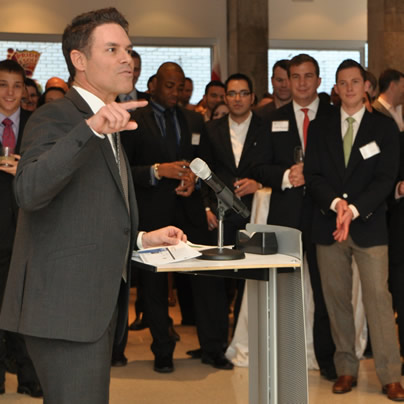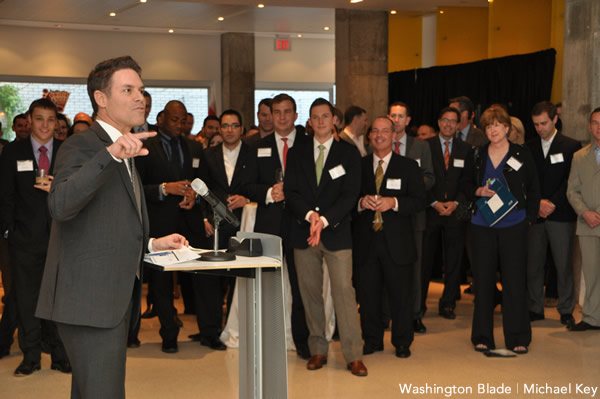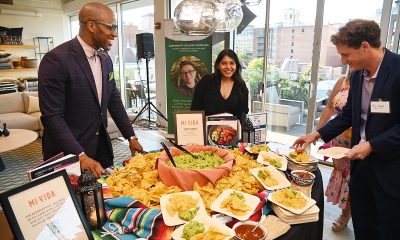Arts & Entertainment
Pointing the way
Scholarships help LGBT students achieve career and education dreams


Jorge Valencia, director of the Point Foundation, at last year's event. (Blade file photo by Michael Key)
The Point Foundation, with offices in New York and Los Angeles, boasts doctors, lawyers, filmmakers and even the nation’s youngest openly gay mayor as alumni of its scholarship program, which has connected gay college students with millions in financial support and a robust professional network for more than a decade.
Yet organizers say there remain countless LGBT students whose educations are cut short by limited funds and unsupportive families. And even as LGBT youth find more mainstream acceptance, interest in the innovative scholarship program has not dissipated.
In fact it’s growing, say organizers who will host a May 3 fundraiser meant to jumpstart donations and boost financial support for the expanding pool of scholars. The event will take place from 6 to 8 p.m. at the Equality Center (1640 Rhode Island Ave. NW). Tickets are $75.
It will feature remarks from founders Bruce Lindstrom and Carl Strickland, as well as success stories shared by some of the Foundation’s growing crop of alumni.
Organizers are finalizing this year’s recipients from a field of some 2,000 applicants, up about 33 percent from last year. Scholars will be announced in June.
“We’re getting a lot more applications from geographically diverse parts of the country, also people of color and women,” says Jorge Valencia, Point’s executive director and CEO. “We’re very happy with that, a lot of that has to do with our outreach efforts.”
The Washington Cornerstone Society event — named for large gift donors — will be one of eight the foundation plans this year to help support the roughly 75 scholars it sponsors annually.
The amount of each scholarship fluctuates based on the number of scholars, but officials say the funds help cover everything from tuition to living expenses for undergraduates and graduate students at institutions across the country. The competitive qualification process involves a 10-part application and culminates with phone and in-person interviews.
Each year, Valencia said, the pile of applications gets thicker.
“That’s why these Cornerstone events are so important,” he says. “We need to be able to raise more money to support these scholars.”
The scholarship program’s continued success is bittersweet, however. Valencia says it’s evidence that there remains a lot of work to be done in boosting acceptance of LGBT youth.
“I hope one day there isn’t a need for organizations that serve underserved communities,” says Valencia, explaining that though scholarships are not limited to scholars who face rejection from their families, those students still comprise many recipients. “The opposition is fighting even harder to make these young people all over the country and all over the world really feel less than equal, so the need is just as high as ever before.”
For Ashland Johnson, rejection came not from her family, but from her employers.
“I worked at Morehouse School of Medicine, my boss found out I was gay and I was fired,” says Johnson, who channeled the messy experience — which eventually involved the American Civil Liberties Union — into a desire to practice LGBT civil rights law.
Johnson had studied English and planned on being a professor before the 2006 incident but soon found herself looking at law schools — and looking for money. In Point Foundation, she says she found both financial support and a commitment to developing fully rounded students through leadership training.
“I saw they were really more than a paycheck,” says Johnson, who graduated in 2011 and now works as policy counsel for the National Center for Lesbian Rights, in Washington.
Scholars are required to complete community service projects benefiting the LGBT community; in exchange, Valencia says they receive support through the duration of their academic career, training opportunities and mentors in their field.
The latter can be invaluable as young professionals navigate complex fields, says Daniel O’Neill, a 2011-2012 scholarship recipient and aspiring primary care physician. Through his program mentor, O’Neill says he has expanded both his knowledge of HIV treatment and his vision of where medicine can take him. He plans to spend time working in San Francisco this year to learn even more about medical issues largely impacting gay and lesbian patients.
“They’ve accelerated my ability to pay it forward and help the LGBT community,” O’Neill says of the foundation. “They’ve galvanized the passion of mine to affirm that I’m part of this large LGBT community.”
Scholars also gain access to the foundation’s large network of prestigious alumni, including one who epitomizes Point’s growing influence.
Alex Morse, mayor of Holyoke, Mass., is the nation’s youngest openly gay mayor and a Point Foundation scholar.
“The Point Foundation assisted me financially as a student at Brown University,” he said in an email. “But more importantly, it introduced me to an intergenerational network of successful members of the [LGBT] community from all across the country. It helped give me the confidence I needed to achieve my goals and set me on a strong path into the future.”
Books
Love or fear flying you’ll devour ‘Why Fly’
New book chronicles a lifetime obsession with aircraft

‘Why Fly’
By Caroline Paul
c. 2026, Bloomsbury
$27.99/256 pages
Tray table folded up.
Check. Your seat is in the upright position, the airflow above your head is just the way you like it, and you’re ready to go. The flight crew is making final preparations. The lights are off and the plane is backing up. All you need now is “Why Fly” by Caroline Paul, and buckle up.

When she was very young, Paul was “obsessed” with tales of adventure, devouring accounts written by men of their derring-do. The only female adventure-seeker she knew about then was Amelia Earhart; later, she learned of other adventuresome women, including aviatrix Bessie Coleman, and Paul was transfixed.
Time passed; Paul grew up to create a life of adventure all her own.
Then, the year her marriage started to fracture, she switched her obsession from general exploits to flight.
Specifically, Paul loves experimental aircraft, some of which, like her “trike,” can be made from a kit at home. Others, like Woodstock, her beloved yellow gyrocopter, are major purchases that operate under different FAA rules. All flying has rules, she says, even if it seems like it should be as freewheeling as the birds it mimics.
She loves the pre-flight checklist, which is pure anticipation as well as a series of safety measures; if only a relationship had the same ritual. Paul loves her hangar, as a place of comfort and for flight in all senses of the word. She enjoys thinking about historic tales of flying, going back before the Wright Brothers, and including a man who went aloft on a lawn chair via helium-filled weather balloons.
The mere idea that she can fly any time is like a gift to Paul.
She knows a lot of people are terrified of flying, but it’s near totally safe: generally, there’s a one in almost 14 million chance of perishing in a commercial airline disaster – although, to Paul’s embarrassment and her dismay, it’s possible that both the smallest planes and the grandest loves might crash.
If you’re a fan of flying, you know what to do here. If you fear it, pry your fingernails off the armrests, take a deep breath, and head to the shelves. “Why Fly” might help you change your mind.
It’s not just that author Caroline Paul enjoys being airborne, and she tells you. It’s not that she’s honest in her explanations of being in love and being aloft. It’s the meditative aura you’ll get as you’re reading this book that makes it so appealing, despite the sometimes technical information that may flummox you between the Zen-ness. It’s not overwhelming; it mixes well with the history Paul includes, biographies, the science, heartbreak, and exciting tales of adventure and risk, but it’s there. Readers and romantics who love the outdoors, can’t resist a good mountain, and crave activity won’t mind it, though, not at all.
If you own a plane – or want to – you’ll want this book, too. It’s a great waiting-at-the-airport tale, or a tuck-in-your-suitcase-for-later read. Find “Why Fly” and you’ll see that it’s an upright kind of book.
The Blade may receive commissions from qualifying purchases made via this post.
Theater
Out actor Kevin Cahoon on starring role in ‘Chez Joey’
Arena production adapted from Broadway classic ‘Pal Joey’

‘Chez Joey’
Through March 15
Arena Stage
1101 Sixth St., S.W.
Tickets start at $93
Arenastage.org
As Melvin Snyder in the new musical “Chez Joey,” out actor Kevin Cahoon plays a showbiz society columnist who goes by the name Mrs. Knickerbocker. He functions as a sort of liaison between café society and Chicago’s Black jazz scene circa 1940s. It’s a fun part replete with varied insights, music, and dance.
“Chez Joey” is adapted from the Broadway classic “Pal Joey” by Richard Rodgers and Lorenz Hart. It’s inspired by John O’Hara’s stories based on the exploits of a small-time nightclub singer published in The New Yorker.
A warm and humorous man, Cahoon loves his work. At just six, he began his career as a rodeo clown in Houston. He won the Star Search teen division at 13 singing songs like “Some People” from “Gypsy.” He studied theater at New York University and soon after graduating set to work playing sidekicks and comedic roles.
Over the years, Cahoon has played numerous queer parts in stage productions including “Hedwig and the Angry Inch,” “La Cage aux Folles,” “Rocky Horror” as well as Peanut in “Shucked,” and George the keyboardist in “The Wedding Singer,” “a sort of unicorn of its time,” says Cahoon.
Co-directed by Tony Goldwyn and the great Savion Glover, “Chez Joey” is a terrific and fun show filled with loads of talent. Its relevant new book is by Richard Lagravenese.
On a recent Monday off from work, Cahoon shared some thoughts on past and current happenings.
WASHINGTON BLADE: Is there a through line from Kevin, the six-year-old rodeo clown, to who we see now at Arena Stage?
KEVIN CAHOON: Anytime I want to land a joke in a theater piece it goes back to that rodeo clown. It doesn’t matter if it’s Arena’s intimate Kreeger Theatre or the big rodeo at the huge Houston Astrodome.
I was in the middle stadium and there was an announcer — a scene partner really. And we were doing a back and forth in hopes of getting laughs. At that young age I was trying to understand what it takes to get laughs. It’s all about timing. Every line.
BLADE: Originally, your part in “Chez Joey” Melvin was Melba who sings “Zip,” a clever woman reporter’s song. It was sort of a star feature, where they could just pop in a star in the run of “Pal Joey.”
CAHOON: That’s right. And in former versions it was played by Martha Plimpton and before her Elaine Stritch. For “Chez Joey,” we switched gender and storyline.
We attempted to do “Zip” up until two days before we had an audience at Arena. Unexpectedly they cut “Zip” and replaced it with a fun number called “I Like to Recognize the Tune,” a song more connected to the story.
BLADE: Wow. You must be a quick study.
CAHOON: Well, we’re working with a great band.
BLADE: You’ve played a lot of queer parts. Any thoughts on queer representation?
CAHOON: Oh yes, definitely. And I’ve been very lucky that I’ve had the chance to portray these characters and introduce them to the rest of the world. I feel honored.
After originating Edna, the hyena on Broadway in “The Lion King,” I left that to do “Hedwig and the Angry Inch” as standby for John Cameron Mitchell, doing one show a week for him.
Everyone thought I was crazy to leave the biggest musical of our time with a personal contract and getting paid more money that I’d ever made to get $400 a week at the downtown Jane Street Theatre in a dicey neighborhood.
At the time, I really felt like I was with cool kids. I guess I was. And I never regretted it.
BLADE: When you play new parts, do you create new backstories for the role?
CAHOON: Every single time! For Melvin, I suggested a line about chorus boys on Lakeshore Drive.
BLADE: What’s up next for Kevin Cahoon?
CAHOON: I’m about to do the New York Theatre Workshop Gala; I’ve been doing it for nine years in a row. It’s a huge job. I’ll also be producing the “Cats: The Jellicle Ball” opening on Broadway this spring; it’s a queer-centric uptown vogue ball with gay actor André de Shields reprising his role as “Old Deuteronomy.”
BLADE: There’s a huge amount of talent onstage in “Chez Joey.”
CAHOON: There is. I’m sharing a dressing room with Myles Frost who plays Joey. He won accolades for playing Michael Jackson on Broadway. We’ve become great friends. He’s a miracle to watch on stage. And Awa [Sal Secka], a D.C. local, is great. Every night the audience falls head over heels for her. When this show goes to New York, Awa will, no doubt, be a giant star.
BLADE: Do you think “Chez Joey” might be Broadway bound?
CAHOON: I have a good feeling it is. I’ve done shows out of town that have high hopes and pedigree, but don’t necessarily make it. “Chez Joey” is a small production, it’s funny, and audiences seem to love it.

The Capital Pride Alliance held the annual Pride Reveal event at The Schuyler at The Hamilton Hotel on Thursday, Feb. 26. The theme for this year’s Capital Pride was announced: “Exist. Resist. Have the audacity!”
(Washington Blade photos by Michael Key)











































